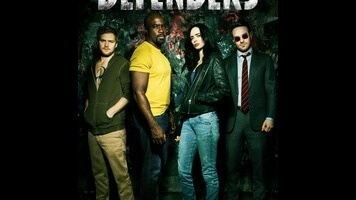In the long-awaited superhero gathering of The Defenders, Marvel’s playing catchup in more ways than one. First, the comic giant’s studio arm has to make the necessary (re)introductions to Daredevil, Jessica Jones, Luke Cage, and Iron Fist, whose team-up was scheduled before Charlie Cox first stepped into Hell’s Kitchen. These callbacks are worked rather effortlessly into the new series’ setup, but are still an effective crash course for anyone who missed out on one or all three of the previous entries. And there’s just the right amount of exposition doled out amid Jessica’s (Krysten Ritter) quipping and Danny Rand’s (Finn Jones) bloviating that being unfamiliar with The Hand doesn’t remain a problem for long.
The economical use of exposition and improved pacing are signs that Marvel Studios and Netflix have been taking notes on the solo series, which have notoriously been light on plot and meandered toward their conclusions. Those issues haven’t been totally resolved; even with just eight episodes, showrunners Marco Ramirez and Douglas Petrie still manage to dawdle. But overall, The Defenders runs leaner and meaner (more on that in a bit) than any other Netflix Marvel show. Even under the lingering shadows, the first episode feels downright breezy at times, making surprisingly quick work of getting our heroes—Matt Murdock (Cox), who’s refusing to go by Daredevil; Jessica; Luke Cage (Mike Colter); and Danny, who just wants everyone to call him Iron Fist already, you guys—back to New York.
This all happens in the premiere, which includes an unintentionally funny moment (or is it?) where Danny is surprised to learn someone actually recognizes him as Iron Fist. That throwaway line is part of what is, if not an outright admission of guilt, then an acknowledgment that momentum has been lost. It’s not just that even the best outings (seasons one of Jessica Jones, Luke Cage, and Daredevil) unfolded at a fitful pace, but the groundwork that had been laid since 2015 was weakened, not reinforced, by Iron Fist. Scott Buck’s contribution to the franchise suffered from a lack of urgency, underwhelming fight sequences, and Jones’ wooden portrayal of the immortal warrior.
In order to recover ground, The Defenders ramps up the action by building off smaller confrontations and actually earning its midseason cliffhanger. Along the way, the show takes frequent swipes at Danny, usually via Jessica or Luke (Daredevil is sympathetic toward the oblivious billionaire, because of course he is). Many of the complaints critics and viewers had about Iron Fist work their way into the dialogue, including the privilege he isn’t aware he’s constantly benefiting from and asserting. At times, the criticism is shoehorned into the conversation; at others, it deals a more devastating blow than Danny’s glowing fist.
Unlike Daredevil (the character and the series), The Defenders doesn’t dwell in self-flagellation mode. The first half of the season is a potent mix of humor, dread, and ass-kicking. Even with Iron Fist tagging along as the annoying younger brother—who could buy and sell you and the building you live in a thousand times over—the Defenders shine as a team and as individuals (well, most of them). Rather than hit pause on their larger arcs, the series explores different parts of Jessica’s recovery and Matt’s penitence, while fleshing out the stories of Luke’s reentry and Danny’s search for vengeance. Those elements are used to both forge and undermine their partnership. Everyone here is a loner, either by preference or circumstance, but they’ll grudgingly work together to protect New York City, which offers something compelling enough to each character that it’s treated as a living organism itself—the gorgeous opening credits are made up of maps of the Big Apple, whose streets are CGI-ed to look like firing synapses and pulsing veins.
And it really is the whole city that is increasingly under attack from The Hand, the clandestine organization first introduced in Daredevil, led here by Alexandra (Sigourney Weaver), an elegant but deadly adversary. Along with Madame Gao (Wai Ching Ho), who we first saw in Daredevil, Alexandra primarily wants to take on—or maybe take out—Iron Fist. But she’s also prepared to dispatch anyone who gets in her way. Enter the super-but-not-heroic friends, who finally band together by the end of episode three. Director Peter Hoar makes that outing mostly worth the wait, but The Defenders can’t quite get away from wasting time.
The big-screen version of the MCU is frequently knocked for its one-note villains, but that’s one issue that the Netflix series have mostly avoided. From Kingpin to Kilgrave to Cottonmouth, the streaming shows have offered up complex antagonists, who go beyond being egomaniacal evildoers. (Madame Gao could make this list, if she weren’t up against such an unworthy foe). In Weaver’s hands, Alexandra is formidable and intriguing, swaddled as she is in what often look like really expensive duvets. Although she’s informed by other MCU villains—Alexandra shares Ronan The Accuser’s zealotry, Mariah’s poise, and Ultron’s indifference to the human condition—she’s much more than just an amalgam. She’s closer to a time lord than a hand-rubbing baddie; she’s both detached from and invested in humanity.
Weaver’s so good in the role that it’s almost a waste to set her primarily against the Iron Fist. In a twist out of a comic, The Defenders comes up against one of its own, as Danny remains the weak link, and Jones appears petulant and almost boorish in the face of everyone else’s soulfulness and poignancy. Ramirez and Petrie may have learned hard lessons about pacing, but they haven’t added much to this character. Still, with Marvel series alumni S.J. Clarkson (who helmed the first two episodes), Lauren Schmidt Hissrich, and Phil Abraham on board, The Defenders has just as powerful a team offscreen as on, and looks ready to block any future blows from Iron Fist.
Reviews by Alex McLevy will run daily from Friday, August 18, through Wednesday, August 23.








































